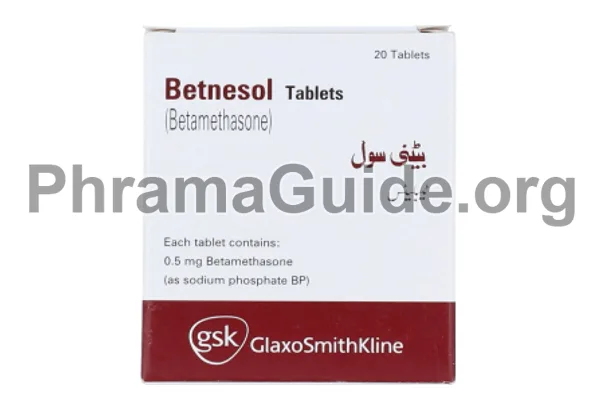Betnesol is a corticosteroid medication that is used to treat a variety of conditions, including inflammation, allergies, and autoimmune diseases. Betnesol can cause a variety of side effects, both common and serious.
Common Side Effects of Betnesol
- Increased appetite
- Weight gain
- Acne
- Unwanted hair growth
- Skin color changes
- Bruising or shiny skin
- Tiny red bumps or rash around the mouth
- Small white or red bumps on the skin
Serious Side Effects of Betnesol
- High blood sugar
- High blood pressure
- Mood changes
- Mental health problems
- Cushing’s syndrome (a condition caused by too much cortisol in the body)
- Adrenal gland problems
- Low potassium levels
- Pancreas problems
- Swelling in the arms or legs
- Blurred vision
- Unexplained bruising or bleeding

What is Betnesol?
Betnesol is one of the leading brands of Betamethasone, manufactured and marketed by Glaxosmithkline Pharmaceuticals Ltd (GSK).
Betnesol : Available Formulations and Strengths
Presently, Betnesol is available in Tablet, Injection, Eye Ointment, and Eye Drops forms
Betnesol Tablet : 0.5mg strength
Betnesol Injection : 4mg/ml strength
Betnesol Eye Ointment : 0.1%w/w strength
Betnesol Eye Drops : 0.1%w/v strength
What Are The Possible Drug Interactions of Betnesol?
- Other Corticosteroids: Combining Betnesol with other corticosteroids can increase the risk of systemic corticosteroid side effects. This includes medications like prednisone, dexamethasone, and hydrocortisone.
- Immune-Suppressing Drugs: Betnesol can suppress the immune system. Combining it with other immunosuppressive drugs, such as cyclosporine or tacrolimus, may increase the risk of infections and immune-related complications.
- NSAIDs (Nonsteroidal Anti-Inflammatory Drugs): Using NSAIDs, such as ibuprofen or aspirin, with Betnesol can increase the risk of gastrointestinal irritation, ulcers, and bleeding. Your doctor may monitor you closely or adjust your treatment plan if you need both medications.
- Anticoagulants (Blood Thinners): There is a potential for increased bleeding when Betnesol is taken with anticoagulants like warfarin or heparin. Your doctor may need to adjust your anticoagulant dose or monitor your blood clotting parameters closely.
- Diabetes Medications: Betnesol can raise blood sugar levels. If you are taking medications for diabetes, such as insulin or oral antidiabetic drugs, your healthcare provider may need to adjust your dosage.
- Vaccines: The use of Betnesol may reduce the effectiveness of certain vaccines. It’s essential to discuss vaccination plans with your doctor while taking this medication.
- Certain Antibiotics: Combining Betnesol with certain antibiotics, particularly quinolones like ciprofloxacin and levofloxacin, may increase the risk of tendon rupture. Inform your healthcare provider if you are taking these antibiotics.
- Antifungal Medications: Some antifungal drugs, like ketoconazole, can inhibit the metabolism of Betnesol, leading to increased levels of the corticosteroid in the body. Your doctor may need to adjust your Betnesol dosage if you are taking such medications.
- HIV Medications: Some drugs used to treat HIV, such as ritonavir and cobicistat, can interact with Betnesol, potentially increasing the risk of corticosteroid-related side effects.
- Medications that Affect Potassium Levels: Betnesol can lower potassium levels in the body. Combining it with medications that affect potassium levels, such as diuretics (water pills), may lead to electrolyte imbalances. Your doctor may monitor your potassium levels and adjust your treatment accordingly.

Leave A Comment